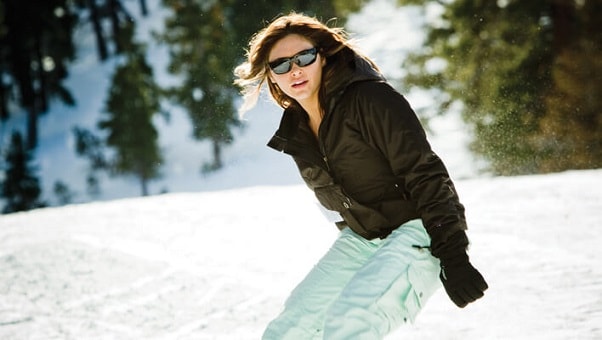
Safeguarding Your Vision: Strategies to Protect Your Eyes in the Winter
As winter arrives, and the cold, cloudy days set in, sunglasses may not be the first thing on your mind. Yet, neglecting winter eye protection can lead to painful temporary conditions and potential permanent eye damage.
The Importance of Winter Eye Protection
Were you aware that even in winter, your eyes can be susceptible to sunburn? The snowy landscape reflects a substantial 80 percent of the sun's ultraviolet (UV) rays. Whether you're engaged in winter sports like skiing or snowboarding or simply working outdoors, UV rays can strike from all angles, even on overcast days.
Exposure to UV rays during winter can result in photokeratitis, commonly known as "snow blindness." Recently, journalist Anderson Cooper experienced temporary vision loss due to this condition, highlighting that intense glare, not just from snow but any reflective surface, can cause symptoms.
Common Winter Eye Problems to Anticipate
Understanding the challenges your eyes face in winter underscores the necessity for eye protection. Several winter eye problems can be avoided with the right preventive measures:
1. Dry Eyes in Winter
Many individuals experience dry eyes during winter, even in humid climates. Cold air holds less water than warm air, and the winter wind further diminishes moisture. Dry eyes may manifest as redness, itching, or a burning sensation.
2. Addressing Watery Eyes in Winter
Contrary to expectations, watery eyes are a common winter woe. Dry air reduces the protective tear layer on the eye's surface, prompting overproduction of tears to compensate.
3. Battling Snow Blindness
Intense UV light created when sunlight reflects off snow can lead to snow blindness. This occurs when the cornea is damaged by the strong UV light, causing temporary blurry vision.
4. Coping with Altitude Problems
If you venture to higher elevations for winter activities, such as skiing, the risk of eye problems escalates. Dry eyes, watery eyes, and snow blindness become more prevalent due to reduced protection from UV light at higher altitudes.
Essential Measures to Protect Your Eyes During Winter
Despite the chill in the air, your eyes are potentially more at risk in winter than in summer. Here are some key steps to safeguard your eyes:
1. Continue Wearing UV-A or UV-B Protecting Sunglasses
Snow reflects sunlight intensely, making the light even brighter than reflections off water. Regardless of the weather, wear sunglasses daily to shield your eyes from UV-ray exposure.
2. Embrace Hats and Hoods for Extra Protection
Protect your eyes from freezing temperatures and harsh winds that contribute to dry eyes. Hats, hoods, and scarves offer valuable winter eye protection. Not only will you feel warmer, but your eyes will also thank you for the added shield against the elements.
3. Apply Sunscreen for Your Face and Neck
Choose a moisturizing sunscreen with an SPF of at least 30. Reapply as directed to shield your face and neck from the winter sun's effects.
4. Opt for Proper Eye Protection Outdoors: Goggles
Whether shoveling snow, doing yard work, or decorating outdoors, wear polycarbonate safety goggles to prevent foreign objects from causing eye injuries.
5. Keep Eye Drops Handy to Combat Dryness
Combat dryness caused by cold, windy conditions with moisturizing eye drops. Additionally, indoor heating systems can contribute to dry eyes, so keep your eyes lubricated.
6. Goggles: A Triple Layer of Protection
Goggles not only shield your eyes from UV rays but also provide a barrier against winter winds, preventing dryness. Moreover, they guard against potential eye injuries from branches, twigs, and debris.
7. Utilize a Humidifier for Indoor Comfort
Combat dry indoor air by using a humidifier at home or work. This helps maintain moisture levels, benefiting not only your eyes but also your skin and overall comfort.
8. Don't Forget to Protect Your Skin
While focusing on eye health, don't forget to protect your skin from the winter sun's effects. A comprehensive approach ensures overall well-being.
9. Wash Hands Before Touching Eyes to Prevent Irritation
During the cold and flu season, diligent handwashing reduces the risk of spreading viruses and bacteria. Avoid touching or rubbing your eyes without washing your hands first to prevent irritation and itchiness.
10. Moderate Indoor Heating to Prevent Dry Eyes
As temperatures drop, resist the temptation to crank up the indoor heat. Dry, hot air indoors can contribute to dry eye symptoms. Position heaters away from your face, both at home and in the car, and avoid sleeping with heaters or fans directed at your face.
11. Stay Hydrated: Drink Water for Eye Health
In the colder months, it's easy to overlook hydration. However, staying well-hydrated can help prevent or alleviate dry eye symptoms. Keep a water bottle with you throughout the day to ensure you drink enough water, benefitting both your eyes and overall health.
Schedule a Visit to Your Optometrist for Comprehensive Eye Care
Prioritize your eye health by scheduling an appointment with an optometrist. Optometrists can conduct vision tests, diagnose eye conditions, and provide treatment. Regular check-ups can detect and address winter-related eye problems, ensuring your eyes remain healthy and your vision stays sharp.
As you navigate the winter months, let comprehensive eye care be part of your wellness routine. Your eyes, and your overall well-being, will thank you.
RESEARCH FOR REFERENCE:
- 6 Ways to Protect Your Eyes this Winter by: Brain Vision Institute
- WINTERIZE YOUR EYES: 9 EYE SAFETY & PROTECTION TIPS
- 10 Ways to Protect Your Eyes in WinterWritten by Heather Cottrell, December 12, 2022
Make your appointment today
To make your appointment, simply give us a call (760)-948-3345 or
or
Due to COVID-19 safety protocols, all eyewear services are currently by appointment only. Please call to make an appointment.
At Golden Eye Optometry, we view good vision care as front line protection at every age. A routine eye exam can detect more than poor vision. It can shed early light on glaucoma, macular degeneration, cataracts and diabetes.